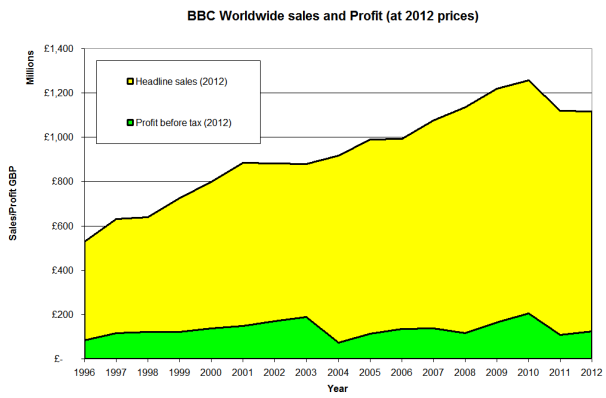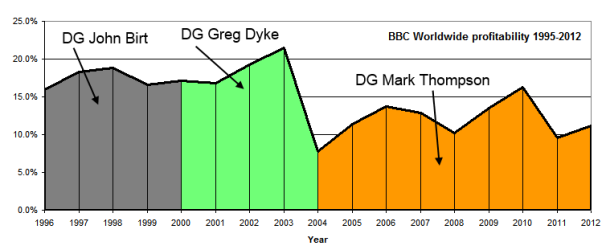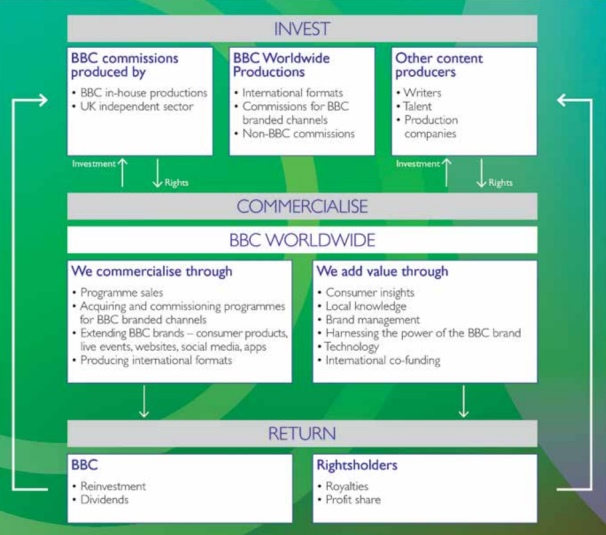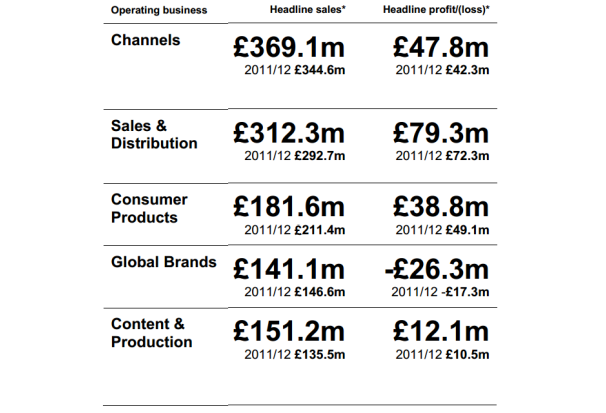Why does BBC Worldwide not make more profit for the Licence Fee payer?
 Brian Butterworth published on UK Free TV
Brian Butterworth published on UK Free TV Looking at the current disagreement between the BBC Trust (BBC Trust: Mark Thompson's claims are 'bizarre' - ITV News) and former Director General Mark Thompson ( Mark Thompson: Chris Patten misled parliament over BBC payoffs - Media - The Guardian ) has me thinking.
In particular the revelation the " BBC agreed to fund £687k payoff after executive's move to commercial arm - Media - theguardian.com "
"The BBC agreed to fund a redundancy payoff of nearly £700,000 to a former senior executive using licence fee money, after she moved to BBC Worldwide, the corporation's commercial arm.
"
It has always struck me that BBC Worldwide seems to be operated as a plaything of the BBC management. So I have gone though the entire Annual Reports from BBC Worldwide (BBC Worldwide Annual Reviews) and plotted the income and profits. As they date back to 1995, I have adjusted the values using the Retail Prices Index.

It does appear that over the years, BBC Worldwide has tripled the income, but the return to the Licence Fee payer has been poor. Looking at the percentage profit made, you can see:

This does rather suggest that BBC Worldwide is performing poorly in terms of the income it makes to reduce the Licence Fee.
If BBC Worldwide had maintained the average performance between 1995 and 2003, which was 18% profit, the BBC would have had an extra income during Mark Thompson director-generalship of £595 million (at 2012 prices).
Which is rather more money than the alleged £30 million wasted on management payoffs.
But what can be done?
The best suggestion I can come up with is to convert BBC Worldwide into a public liability company, with perhaps 51% of the shares remaining with the BBC. You could argue that would provide a much needed cash reserve for the BBC's UK operations, and going forward BBC Worldwide plc might be keener to make a profit with shareholders, rather than BBC managers, keeping a watchful eye.
I would be interested to hear if anyone has any better ideas.
8:17 PM
Brian, I think if anything I made an understatement regarding the BBC gravy train, next week will feature the Duel between Patten & Thompson, this will lead to further revalations about the "Corrupt corporation" - my prediction is the BBC as we know it will be on it's deathbed by 2015 & will be finished by 2017, perhaps replaced by a smaller, leaner PSB.
| link to this comment |
Bob Meade: what are these "further revalations" of which you speak?
| link to this comment |
12:40 AM
Ormskirk
Without wishing to defend the BBC or Mark Thompson, BBC Worldwide's profits going down could be due to a number of factors that are not obvious from their accounts alone, Increasingly the programmes appear to be made the BBC that can be sold worldwide are funded in partnership with foreign broadcasters. Many documentaries are made in conjunction with the Open University, or commissioned by the BBC from private studios. For example Aardman, There are also intellectual rights to the programme format that may be involved.
Any of these may have savvy and negotiated better returns than in the past forcing down profits in BBC Worldwide in the last 10 years.
Furthermore there is no doubt a sale from BBC UK to BBC Worldwide up front and Mark Thompson may have himself demanded better up front fees,
I appreciate I am only speculating, but it seems to me that looking solely at BBC Worldwide's bottom line profit can be misleading. Without looking at onward sales contracts and the bigger picture the supposed conclusion could be wrong.
| link to this comment |
Roger's: mapR's Freeview map terrainR's terrain plot wavesR's frequency data R's Freeview Detailed Coverage
12:34 PM
Brianist: I've been mulling over your observations for a couple of days, but Roger has outlined a couple of my concerns about taking just the headline profit figure. Plenty of banks had great profits, but their balance sheets contained a great many problems, and it might be the reverse in this case.
Firstly, the RPI might not be the best yardstick for TV/Film production. The sectors inflation rate has generally run ahead of RPI, due to increased labour costs, etc (this is nothing new - Hollywood producers complained of this back in the 20's!). healthcare is another sector where this happens, so we do have to be careful about using a non-sector figure.
Secondly, although we think of Worldwide's business model to be largely one of getting stuff from the BBC (where its paid for), and then selling it, for a profit, Worldwides operations are wider and more complex. It co-owns publishing and production companies, produces its own material, supplies other broadcasters with material (America's NPR news takies a great deal of the BBC World Service feed), acts as a distributor for indie producers, sells formats, handles merchandising rights, and has BBC channels abroad, such as BBC America.
In the case of many prgrammes, Worldwide commissions and pays for the production Televisual | NEWS & COMMENTS - we will see it here, but the productions costs are not borne by the 'home' BBC - think of it as payment in kind, not just cash.
It has to buy the rights for UK shows from the 'home' BBC (as Roger points out, Thompson might have demanded better upfront fees, thus costing Worldwide more, and making more for 'home' BBC), as well as spend on indie productions BBC Worldwide Eyes Record Spending on U.K. Content - The Hollywood Reporter - and of course this investment has to come from somewhere.
The costs of buying 'Top Gear', etc sound high, but the brand is valuable, and the format is popular - in the long term, this will be a good investment.
The third thing to bear in mind is that every business is subject to change, year on year. Currency rates, the state of the economy (a commercial broadcaster is vunerable to ad spend, and obviously may not buy so much material) and what the market is like varies from year to year. I bet that the spike in profits might have had a lot to do with format sales, such as 'Strictly' - there will be a continuing payment while in prodcution, but there is also initial fees. Such fees can bulk up one years accounts, but of course formats cannot be churned out every year.
The fourth caveat is very important, and is closely linked to the second - Worldwide cannot borrow money, as you point out (unique in a billion dollar internation business!), nor can it fund any channel outside the UK from the license fee. Therefore, it has to reinvest its own profits to fund future growth. It cannot both give a higher return to its 'shareholder' and continue to expand commercially, at least in the short term. However, the money it does not give to the BBC now (and of course the BBC benefits from programmes Worldwide make) will allow a better rate of return in years to come.
Roger is spot on - we have to look at the bigger picture, and it would be interesting to see how ITV overseas works, and what its business is like.
As for the BBC payoffs - stupid, but highups do tend to end up with a sense of entitlement.
However, the BBC is probably one of the most self critical organistations out there, to the point of self-flagulation. Small problems (which in an organisation of its size are always going to happen) are blown up, often by the print media (which has its own agenda), and politicians (ditto). The BBC then reports this, thus making everything seem much worse. Contrast this with the Murdoch press, which mentioned almost nothing about the phone scandal, and then tried to blame the Guardian and the BBC for covering it.
I'm much more concerned about reports that the BBC Trust will be killed off, and Ofcom take over. Having had dealings with Ofcom, I can attest to it being one the most useless watchdogs out there, and something the BBC has no need of.
The BBC is one of the best forms of 'soft power' ot there, and we would be poorer without it. Bob Meade might want a slimmed down PBS - have a look/listening at PBS in the US - very good in many ways, but its often middle of the road (at best), lacks coherence, and certainly starved of the sort of resources which the BBC has. You don't want to go down that road.
| link to this comment |
@Roger Martlew: Thank you for your comments.
You said "Increasingly the programmes appear to be made the BBC that can be sold worldwide are funded in partnership with foreign broadcasters", but I'm not sure if this is the case. For example. the long-standing relationship - since 1998 - with Discovery Inc will come to an end in 2014.
Discovery to end BBC tie-up | News | Broadcast
Jana Bennett arguing it provided "exceptional value for licence fee payers", it is thought to be worth around £35m a year.
You also said "Many documentaries are made in conjunction with the Open University, or commissioned by the BBC from private studios"
This is true. This has been the case since the introduction of "Producers Choice" back in 1995.
You also said "There are also intellectual rights to the programme format that may be involved.", but again, how does this change over time?
You said "there is no doubt a sale from BBC UK to BBC Worldwide up front and Mark Thompson may have himself demanded better up front fees".
This is entirely false. BBC Worldwide has the exclusive rights to the resale of BBC programmes. The BBC receives the profit from BBC Worldwide's operations, not fees.
I think your final point rather agrees with the main thrust of my argument: BBC Worldwide is not open to scrutity from outside, so we can't know if it being run well.
| link to this comment |
MikeB: Thanks you for your very considered response.
I've responded to Roger Martlew above.
Looking at your specific points: firstly, on the matter of using RPI. Of course, it can be argued that RPI isn't the best measure in a specific industry.
If you are arguing that there has been greater inflation (as I think you are) then this has two effects. Firstly, it makes the profits been made today smaller by comparison to the past, which makes the situation today much worse.
And, of course, this doesn't affect the percentage profit figures, which will stay the same.
I agree with your second point, which BBC Worldwide does more than resell stuff made already by BBC UK. They have a diagram in their annual report [1], thus

You can see the figures in the accounts [2]

So, Channels made a profit of 13.0%, Sales and Distribution 25.4%, Consumer Products 21.4%, Content and Production 8.0%.
Global Brands a LOSS of 18.6%
Channels: Offers a global showcase for the best of British television via a portfolio of 34 international, BBC-branded TV channels and the pilot of the Global BBC iPlayer. A further 10 channels - the UKTV portfolio - operate in the UK through a joint venture with Scripps Networks Interactive. The business also manages affiliate sales for BBC World News.
Sales & Distribution: The largest distributor of finished TV programmes outside the US studios with a sales team present in 11 global offices serving over 200 territories. Distributes BBC Worldwide catalogue of high quality content to over 700 international broadcasters and digital platforms
Consumer Products: Global producer and distributor of TV-based packaged media. Encompasses video (including DVD, Blu-ray and download-to-own (DTO)), licensed merchandise, music, book and audio publishing partnerships. Also the home of BBCShop.com.
Global Brands: Enhances the long-term value of BBC Worldwide major brands, creates closer consumer engagement, and identifies and cultivates emerging businesses such as Live Entertainment and Digital Entertainment & Games
Content & Production: Develops, commissions and acquires content for all BBC Worldwide businesses. Runs a global network of production studios and manages the slate of output, equity and partnership deals with the indie sector as well as the primary relationship with BBC production. Also provides expertise to producers, bringing together interested investors to enable projects to come to fruition.
[1] http://www.bbcworldwide.c….pdf
[2] http://www.bbcworldwide.c….pdf
Continues....
| link to this comment |
MikeB: You point made about BBC Worldwide buying and commissioning non-BBC programmes is also fair. In reponsobe, I ask: Why is BBC Worldwide doing this if it can't make at least 20% profit on such ventures. BBC Worldwide doesn't exists for ANY OTHER PURPOSE than to make money for BBC UK.
If it's not making a good profit, then it's just a "BBC Management plaything" to which I object in the strongest possible terms.
Your point about "record spending" is rebuffed by point back to your initial comment about RPI. These amounts are only record in cash terms, they are not records in real terms.
I'm not objecting to the BBC buying up brands or anything of that nature. I just want to see a return of 15% profits of more. That's all.
Your "third thing" about "Currency rates, the state of the economy" is valid. However, the "boom years" were 2001-2008, and the "crash and austerity" from 2008-2012. This doesn't march up with anything on the graphs at all.
I already mentioned in my comments to Graham Hall about BBC Worldwide not being able to borrow to invest.
I also agree that the BBC payoffs were "stupid", but I worry that they will do harm.
You can argue that the clash between the BBC Trust and BBC Management is WHAT IS SUPPOSED TO HAPPEN.
I remember having a joke with the BBC's Nick Higham Nick Higham (highamnews) on Twitter - up at Edinburgh that he was the "flagellator in chief", when the BBC was in the middle of another "scandal".
I'm not sure if Ofcom wants to "take over" the BBC. I'm going there next week to a Q-and-A with Mr Ed Richards, so I will see if I can ask them.
I must say that I am being critical of the BBC at this point because I wish to see it sort itself out, not because I wish it harm.
| link to this comment |
5:01 PM
The problem is that the BBC trust has clearly failed to represent licence payers. For me it was the way the complaints about BBC HD bitrates were handled. An Ofcom take over would be even worst. They were the ones who reduced the DAB nitrates dispite public opposition.
The BBC should be reduced in size with the rest being sold off.
| link to this comment |
6:06 PM
Trevor Harris:
The reduction in the bitrates on the BBC multiplex in November 2001 was nothing to do with the Radio Authority (Ofcom's predecessors).
This decision was taken by BBC Management (approved by the BBC Board of Governors) to add the new digital stations.
The bitrates on the BBC's national multiplex have not altered since November 2001.
| link to this comment |
11:12 PM
Brianist: You make a very convincing case! Certainly a sector only inflation rate both explains lower profits, but also masks poor performance.
Looking at the various parts of the organisation, its clearly Global Brands which has the major problem, and its clear that this needs looking at. However, some these losses are single year, stemming from:
' The division also incorporates results for Lonely Planet before its sale to NC2 Media in March 2013. This year, Global Brands sales were affected by the transfer of BBC.com to BBC Global News Ltd, and the closure of Good Food magazine in Australia. Headline sales were down 3.8% at £141.1m (2011/12: £146.6m) with headline losses of £26.3m (2011/12: loss of £17.3m).'
These are one-offs, but since it made a loss the previous year as well, your right to point up the loss, and hopefully this division can turned around. Its brands are certainly valuable!
Your right about the graph - I'm going to dig into the figures when I get the chance...
Personally, I think that the ban on borrowing has probably been no bad thing, since it at least stopped the sort of reckless expansion which we saw some years ago. Instead, Worldwide has had to grow steadily, although it has made mistakes (Lonely Planet being the most obvious - print in a digital world?). However, it is strange that such a large organisation is restricted in this way, and probably frustrating.
Perhaps before BBC exec (or their agents/lawyers) do anything with money, they should think how its going to look on the front of the Daily Mail - it certainly would make their lives easier. Unfortunately, the senior team at the BBC is looked at in a very different way from any other channel, which smacks of a double standard, but its the world we live in. Any problem is used by the BBC's enemies, and frankly, they should not give them any ammunition.
On the other hand, Nick Higham does not have breath extra life into every tiny 'problem'. Like you, being critical of the BBC when its due is because we want it to survive and grow. Unfortunately, not all critics have the same motives.
The ST's report comes from government sources, and this latest 'scandal' is a casus belli - government has long wanted the BBC under its thumb. It could be a balloon, to see what the reaction will be, but I suspect they mean it. Patten will put up a fight though...
| link to this comment |